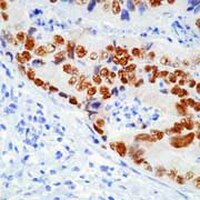OP140 Sigma-AldrichAnti-p53 (Ab-12) (Pantropic) Mouse mAb (DO-7)
This Anti-p53 (Ab-12) (Pantropic) Mouse mAb (DO-7) is validated for use in Frozen Sections, Immunoblotting, IF, IP, Paraffin Sections for the detection of p53 (Ab-12) (Pantropic).
More>> This Anti-p53 (Ab-12) (Pantropic) Mouse mAb (DO-7) is validated for use in Frozen Sections, Immunoblotting, IF, IP, Paraffin Sections for the detection of p53 (Ab-12) (Pantropic). Less<<Recommended Products
Overview
| Replacement Information |
|---|
Key Specifications Table
| Species Reactivity | Host | Antibody Type |
|---|---|---|
| B, H, Mk | M | Monoclonal Antibody |
Products
| Catalog Number | Packaging | Qty/Pack | |
|---|---|---|---|
| OP140-100UG | Plastic ampoule | 100 μg |
| References | |
|---|---|
| References | Greenblatt, M.S., et al. 1994. Cancer Res. 54, 4855. Lane, D.P. 1992. Nature 358, 15. |
| Product Information | |
|---|---|
| Form | Liquid |
| Formulation | In 10 mM PBS, pH 7.4. |
| Positive control | SKBR-3 or MDA-231 cells or colon carcinoma tissue |
| Preservative | None |
| Quality Level | MQ100 |
| Physicochemical Information |
|---|
| Dimensions |
|---|
| Materials Information |
|---|
| Toxicological Information |
|---|
| Safety Information according to GHS |
|---|
| Safety Information |
|---|
| Product Usage Statements |
|---|
| Packaging Information |
|---|
| Transport Information |
|---|
| Supplemental Information |
|---|
| Specifications |
|---|
| Global Trade Item Number | |
|---|---|
| Catalog Number | GTIN |
| OP140-100UG | 07790788053871 |
Documentation
Anti-p53 (Ab-12) (Pantropic) Mouse mAb (DO-7) SDS
| Title |
|---|
Anti-p53 (Ab-12) (Pantropic) Mouse mAb (DO-7) Certificates of Analysis
| Title | Lot Number |
|---|---|
| OP140 |
References
| Reference overview |
|---|
| Greenblatt, M.S., et al. 1994. Cancer Res. 54, 4855. Lane, D.P. 1992. Nature 358, 15. |









